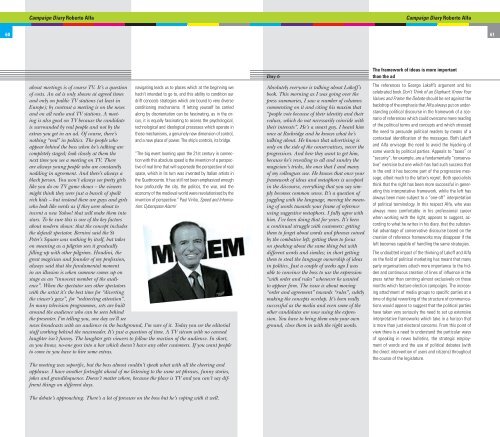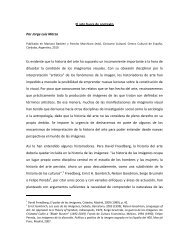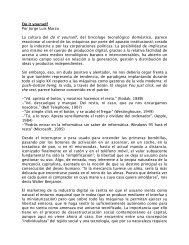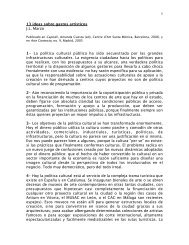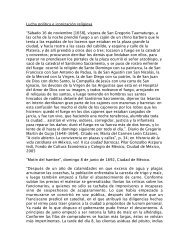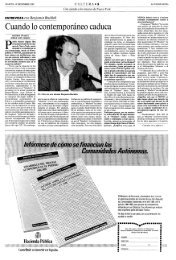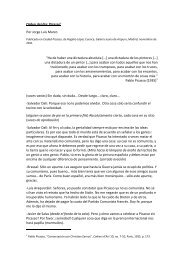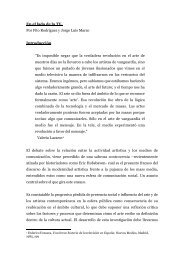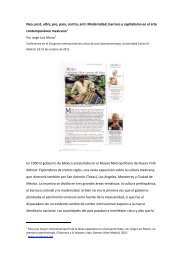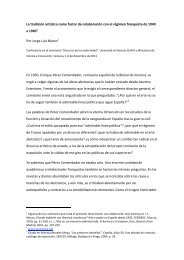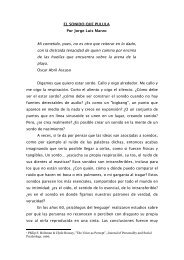Spots Electorales. El espectáculo de la democracia - Soymenos.net
Spots Electorales. El espectáculo de la democracia - Soymenos.net
Spots Electorales. El espectáculo de la democracia - Soymenos.net
Create successful ePaper yourself
Turn your PDF publications into a flip-book with our unique Google optimized e-Paper software.
Campaign Diary Roberto AlfaCampaign Diary Roberto Alfa60 61about meetings is of course TV. It’s a questionof costs. An ad is only shown at agreed timesand only on public TV stations (at least inEurope); by contrast a meeting is on the newsand on all radio and TV stations. A meetingis also good on TV because the candidateis surroun<strong>de</strong>d by real people and not by theextras you get in an ad. Of course, there’snothing “real” in politics. The people whoappear behind the boss when he’s talking arecompletely staged; look closely at them thenext time you see a meeting on TV. Thereare always young people who are constantlynodding in agreement. And there’s always ab<strong>la</strong>ck person. You won’t always see pretty girlslike you do on TV game shows – the viewersmight think they were just a bunch of spoiltrich kids – but instead there are guys and girlswho look like nerds as if they were about toinvent a new Yahoo! that will make them intostars. To be sure this is one of the key factorsabout mo<strong>de</strong>rn shows: that the concept inclu<strong>de</strong>sthe <strong>de</strong>fault spectator. Bernini said the StPeter’s Square was nothing by itself, but takeson meaning as a pilgrim sees it graduallyfilling up with other pilgrims. Houdini, thegreat magician and foun<strong>de</strong>r of my profession,always said that the fundamental momentin an illusion is when someone comes up onstage as an “innocent member of the audience”.When the spectator sees other spectatorswith the artist it’s the best time for “divertingthe viewer’s gaze”, for “redirecting attention”.In many television programmes, sets are builtaround the audience who can be seen behindthe presenter. I’m telling you, one day we’ll seenavigating leads us to p<strong>la</strong>ces which at the beginning wehadn’t inten<strong>de</strong>d to go to, and this ability to condition ourdrift conceals strategies which are bound to very diverseconditioning mechanisms. If letting yourself be carriedalong by disorientation can be fascinating, as in the circus,it is equally fascinating to access the psychological,technological and i<strong>de</strong>ological processes which operate inthese mechanisms, a genuinely new dimension of control,and a new p<strong>la</strong>ce of power. The ship’s controls, its bridge.“The big event looming upon the 21st century in connectionwith this absolute speed is the invention of a perspectiveof real time that will superse<strong>de</strong> the perspective of realspace, which in its turn was invented by Italian artists inthe Quattrocento. It has still not been emphasized enoughhow profoundly the city, the politics, the war, and theeconomy of the medieval world were revolutionised by theinvention of perspective.” Paul Virilio, Speed and Information:Cyberspace A<strong>la</strong>rm!news broadcasts with an audience in the background, I’m sure of it. Today you see the editorialstaff working behind the newsrea<strong>de</strong>r. It’s just a question of time. A TV sitcom with no canned<strong>la</strong>ughter isn’t funny. The <strong>la</strong>ughter gets viewers to follow the reaction of the audience. In short,as you know, no-one goes into a bar which doesn’t have any other customers. If you want peopleto come in you have to hire some extras.The meeting was soporific, but the boss almost couldn’t speak what with all the cheering andapp<strong>la</strong>use. I have another fortnight ahead of me listening to the same set phrases, funny stories,jokes and grandiloquence. Doesn’t matter where, because the p<strong>la</strong>ce is TV and you can’t say differentthings on different days.The <strong>de</strong>bate’s approaching. There’s a lot of pressure on the boss but he’s coping with it well.Day 6Absolutely everyone is talking about Lakoff’sbook. This morning as I was going over thepress summaries, I saw a number of columnscommenting on it and citing his maxim that“people vote because of their i<strong>de</strong>ntity and theirvalues, which do not necessarily coinci<strong>de</strong> withtheir interests”. He’s a smart guy. I heard himonce at Rockridge and he knows what he’stalking about. He knows that advertising isonly on the si<strong>de</strong> of the conservatives, never theprogressives. And here they want to get him,because he’s revealing to all and sundry themagician’s tricks, the ones that I and manyof my colleagues use. He knows that once yourframework of i<strong>de</strong>as and metaphors is acceptedin the discourse, everything that you say simplybecomes common sense. It’s a question ofjuggling with the <strong>la</strong>nguage, moving the meaningof words towards your frame of referenceusing suggestive metaphors. I fully agree withhim. I’ve been doing that for years. It’s beena continual struggle with customers: gettingthem to forget about words and phrases coinedby the combative left; getting them to focuson speaking about the same thing but withdifferent words and similes; in short gettingthem to steal the <strong>la</strong>nguage ownership of i<strong>de</strong>asin politics. Just a couple of weeks ago I wasable to convince the boss to use the expression“with or<strong>de</strong>r and rules” whenever he wantedto appear firm. The issue is about moving“or<strong>de</strong>r and agreement” towards “rules”, subtlymaking the concepts over<strong>la</strong>p. It’s been reallysuccessful as the media and even some of theother candidates are now using the expression.You have to bring them onto your ownground, close them in with the right words.The framework of i<strong>de</strong>as is more importantthan the adThe references to George Lakoff’s argument and hiscelebrated book Don’t Think of an <strong>El</strong>ephant: Know YourValues and Frame the Debate should be set against thebackdrop of the emphasis that Alfa always put on un<strong>de</strong>rstandingpolitical discourse in the framework of a scenarioof references which could overcome mere readingof the political terms and concepts and which stressedthe need to persua<strong>de</strong> political rea<strong>de</strong>rs by means of acontextual i<strong>de</strong>ntification of the messages. Both Lakoffand Alfa envisage the need to avoid the hijacking ofsome words by political parties. Appeals to “taxes” or“security”, for example, are a fundamentally “conservative”exercise but one which has had such success thatin the end it has become part of the progressive message,albeit much to the <strong>la</strong>tter’s regret. Both specialiststhink that the right has been more successful in generatingthis interpretative framework, while the left hasalways been more subject to a “one-off” interpretationof political terminology. In this respect Alfa, who wasalways more comfortable in his professional careerwhen working with the right, appears to suggest, accordingto what he writes in his diary, that the substantia<strong>la</strong>dvantage of conservative discourse based on thecreation of reference frameworks may disappear if theleft becomes capable of handling the same strategies.The undoubted impact of the thinking of Lakoff and Alfaon the field of political marketing has meant that manyparty organisations attach more importance to the hid<strong>de</strong>nand continuous creation of lines of influence in thepress rather than centring almost exclusively on thosemonths which feature election campaigns. The increasingattachment of media groups to specifi c parties at atime of digital reworking of the structure of communicationswould appear to suggest that the political partieshave taken very seriously the need to set up extensiveinterpretative frameworks which take in a horizon thatis more than just electoral concerns. From this point ofview there is a need to un<strong>de</strong>rstand the particu<strong>la</strong>r waysof speaking in news bulletins, the strategic employmentof words and the use of political <strong>de</strong>bates (withthe direct intervention of users and citizens) throughoutthe course of the legis<strong>la</strong>ture.


